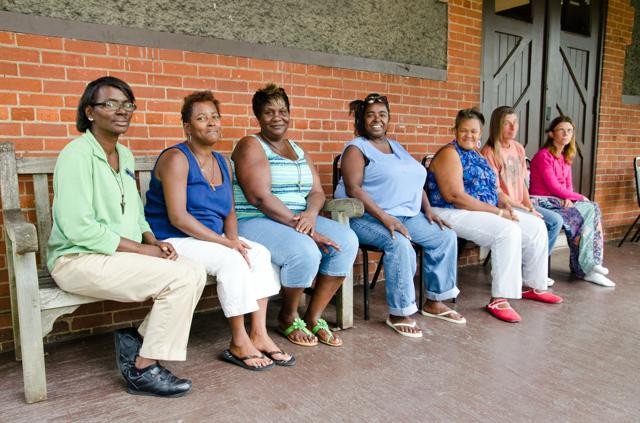There are nearly 634,000 homeless men, women and children in America, according to the U.S. Department of Housing and Urban Development. About 14,000 are in North Carolina, and in Buncombe County, about 125 of them are women without children.
“Homelessness is a problem that impacts everyone. We all need to be part of the solution,” says Sharon Blythe, the Asheville director for Room In The Inn (RITI), a faith-based program that houses a dozen women each week. In 1985, she explains, Catholic priest Charles Strobel founded RITI in Nashville, Tenn. He had observed parishioners and others sleeping in their cars in his church parking lot. Offering them one night’s sleep just didn’t seem to solve the problem, so he called on the local faith community to develop RITI.
In the years since, the program spread across the Southeast, and about a dozen years ago, three local pastors —Beth Duttera Newman, Ashley Crowder-Stanley and Judith Welchel — concluded that there were few, if any, housing options for local homeless women, Blythe explains. She was then a volunteer on a Methodist coordinating committee and later became director when local nonprofit Homeward Bound took over in 2010.
Blythe says, “Housing must be the first step in rehabilitating these women.” Some of them are the victims of abuse, have addiction problems or have faced health issues. To qualify for RITI, applicants must be adult women without dependent children; they must be healthy (physically and mentally); and they must have a genuine need. If an applicant has an addiction or a health problem, Blythe first tries to get them into treatment. Openings occur regularly, she notes, as RITI and Homeward Bound help them get stable, permanent housing. Blythe also sets up and maintains the relationships between participating organizations and Homeward Bound.
Over the years in Asheville, she reports, RITI has helped about 900 women find housing and rebuild their lives. Last year, RITI moved 18 participants into permanent housing.
Each week, one of about 40 faith organizations play hosts, starting each Sunday evening, she continues. Volunteers set up beds, dormitory-style, so that each woman has her own secure place to sleep and a spot to leave her personal items. A North Carolina mattress company donates the beds; sheets are supplied by Mission Health; blankets are provided by Owen Manufacturing; and local faith groups donate other items, Blythe explains.
Each group, congregation or synagogue recruits volunteers who provide dinners, evening activities, breakfast, sack lunches and transportation. Each morning, volunteers take them to jobs, a treatment facility, or to the Homeward Bound offices.
Each year, nearly 2,000 volunteers help make RITI work, and each participating organization grants a stipend that helps fund its director, case management, supplies and other needs.
The roster of women changes periodically, as participants get jobs with income sufficient for housing, their situations change or they must be removed for misbehavior, addiction, a health or personal crisis, interpersonal difficulties with the other women, or some other circumstance. So far, the longest a person has stayed in RITI in Asheville is two years, says Blythe, but there is no time limit.
“By providing weeks of hospitality to women who otherwise would have no place to go, I believe our faith communities have formed an important safety net for some of our most vulnerable members,” says Rev. Michael Poulos, associate pastor of First Presbyterian Church and board president of Homeward Bound.
He mentions another program that adds another layer of support for many RITI participants: “Hope to Home teams are matched with formerly homeless persons who are now in permanent housing, and the teams provide a year of practical and relational support,” Poulos says. “This helps the people adjust to the demands of housing. Last year we placed 234 folks in housing, but the statistic I’m most proud of is that 89 percent of them are still there.”
RITI’s local hosts change from time to time and include faith groups of many denominations, Blythe adds. Some groups, instead of housing the 12 women each week, provide toiletries, extra linens, food and transportation when needed. The women do not have to profess the beliefs of host organizations, join any church, or attend any religious services, although they may, she notes.
Says Poulos, He adds, “We couldn’t do this without the support of the broader Asheville-Buncombe community.”
For more information, call 258-1695 or go to avl.mx/za or hbofa.org.
— DeWitt Robbeloth is an Asheville-based freelance writer and blogger. For more of his work, go to up2p.com.




I stayed a riti for a good while, it was the best thing i ever did, i learned to be myself, help myself to take care of me first, thank you Sharron, i love you
I stayed at titi for a while, i was taught to take care of me , and taught to love me again and i thank Sharron and the ladies I was in there with god bless you all , i am stronger now i have my own place now and am happy ty